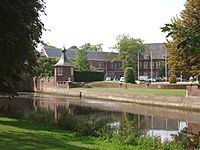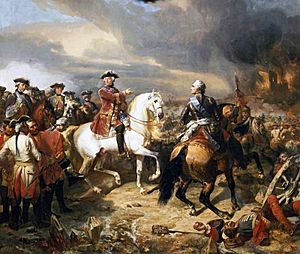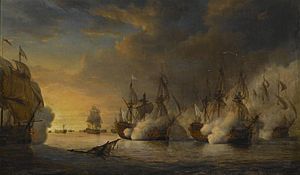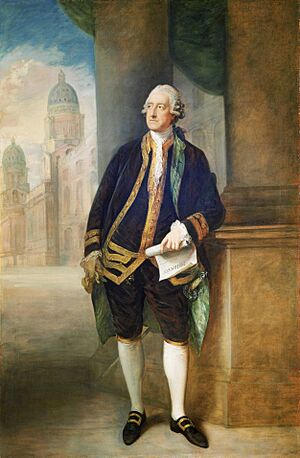Congress of Breda facts for kids

Breda Castle, used by the British delegation
|
|
| Context | Britain and France agree peace terms for the subsequent 1748 Treaty of Aix-la-Chapelle, ending the 1740-1748 War of the Austrian Succession |
|---|---|
| Location | Breda, Dutch Republic |
| Negotiators |
|
| Parties | |
The Congress of Breda was a series of important peace talks. These talks happened between Great Britain and France. They took place in the Dutch city of Breda from 1746 to 1748. The main goal was to end the War of the Austrian Succession.
The discussions at Breda helped create the 1748 Treaty of Aix-la-Chapelle. This treaty officially ended the war. By 1746, the war was mostly a fight between Britain and France. France was winning battles on land, but Britain was strong at sea. Both countries were spending a lot of money on the war. France was especially struggling because the British navy was blocking their ships. This caused food shortages.
The idea was for France and Britain to agree on peace terms first. Then, they would present these terms to their allies. The other countries involved in the war were not part of the early talks. Britain tried to make the talks last longer. They hoped to get a better position in the war. However, France won key battles in 1747. These defeats made Britain agree to the peace terms.
In the long run, these talks changed European politics. Austria and France, who had been enemies for over 300 years, started to become closer.
Contents
Why Did the War Start?
The War of the Austrian Succession began in 1740. At first, Britain was busy with another war. This was the War of Jenkins' Ear against Spain. It was mostly fought in the Caribbean Sea. By 1742, that war was mostly a tie.
France declared war on Britain in March 1744. Spain also joined the fight in Europe. Spain wanted to get back lands in Northern Italy. These lands were lost to Austria and Sardinia in 1713. Britain gave money to Austria to help them. With this help, Austria pushed Spanish troops out of Northern Italy by late 1746.
France could no longer afford to pay Spain for the war. Maria Theresa of Austria, the ruler of Austria, also wanted peace. She needed time to fix her country's government.
What Was Happening During the War?
Even though France won battles in Flanders, Britain's navy was very powerful. The British navy blocked French trade ships. This hurt France's economy badly. Meanwhile, Britain's trade was growing. France wanted to stop Britain from becoming too strong. They saw Britain's growing trade as a threat to the balance of power in Europe.
When France declared war on the Dutch Republic, things got worse for them. The Dutch had been neutral before. They were the main carriers of French goods. By 1747, France's money system was almost collapsing. There were also serious food shortages across the country.
Britain was also finding the war very expensive. But some British leaders wanted to keep fighting. They hoped that with Dutch help, they could take over the Austrian Netherlands. However, the Dutch were not as strong as Britain hoped. Also, Britain hoped to make an alliance with Spain. But this did not happen after the Spanish king, Philip V of Spain, died in July 1746.
The Peace Talks Begin

The peace talks started in August 1746. Lord Sandwich led the British team. The Marquis de Puisieux led the French team. Lord Sandwich and the British stayed near Breda Castle. The Prince of Orange, William IV, Prince of Orange, let them use it.
The talks went slowly. Britain wanted to wait. They hoped their position in Flanders would get better. France wanted to agree to terms right away. They suggested that the Low Countries should be neutral in future wars.
France was not happy with their negotiator, Puisieux. They replaced him. Lord Sandwich used this to delay the talks even more. He demanded that the new French negotiator prove he was officially allowed to negotiate. There were more delays when a Spanish representative showed up. He claimed to speak for Ferdinand VI of Spain, the new king of Spain.
The British knew what the French were planning. British postmasters were paid to secretly copy letters to the French delegates.

Lord Sandwich also helped bring William of Orange to power in the Netherlands. Britain hoped the Dutch joining the war would help them against France. But it did not work out that way. The Dutch needed a lot of money from Britain. The Allied forces also suffered big defeats. They lost the Battle of Lauffeld in July and Bergen op Zoom in September.
After these losses, Britain agreed to settle terms with France. They did this before talking to their allies. Britain might not have realized how important their victory at the Second Cape Finisterre was. This naval battle in October stopped French naval operations. It put their entire colonial empire at risk.
As part of the agreement, the fortress of Louisbourg in North America was traded. Britain had captured it in 1745. It was exchanged for Madras, India, which France had captured in 1746. France also agreed to leave the Low Countries. Both countries recognized that Prussia would control Silesia.
What Happened Next?
A larger meeting was held at Aix-la-Chapelle. All countries involved in the war came to confirm the terms. These terms were already agreed upon by Britain and France at Breda. Peace was officially made with the 1748 Treaty of Aix-la-Chapelle.
Maria Theresa of Austria was very angry. Britain had agreed to Prussia taking Silesia without any Austrians being there. This was a big reason why the alliance between Britain and Austria broke down.
Lord Sandwich was rewarded for his work. He became the First Lord of the Admiralty. However, he and other British leaders were criticized. People thought they gave up Louisbourg too easily. In France, many people were upset. They had won so much land in Flanders but had to give it all back for very little in return. People started saying "as stupid as the Peace" to show how much they disliked the terms. Overall, the treaty did not make anyone truly happy. It also did not solve the main problems that caused the war in 1740.
Images for kids
 | Stephanie Wilson |
 | Charles Bolden |
 | Ronald McNair |
 | Frederick D. Gregory |



